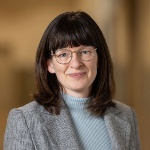Since 2018, the Federal Ministry of Education and Research (BMBF) has presented the annual Quantum Future Award for outstanding theses in the field of applied quantum technologies. The ten best applicants in the Master's and doctoral categories were invited to Berlin on November 29 to present their work in three-minute pitches.
Dr. Christian Hölzl from the 5th Institute of Physics convinced the jury with his doctoral thesis and his pitch, which earned him second place in the doctoral category.
Quantum simulation based on circular Rydberg atoms
In the BMBF Quantum Future project 'CiRQus - Circular Rydberg Atom Quantum Simulator', Hölzl is researching the foundations for future quantum computers - a promising, extremely powerful new type of computer. Under the leadership of Dr. Florian Meinert, the CiRQus team is working on further developing quantum simulators. This is a type of quantum computer that specializes in certain tasks. “Quantum simulators can help us to clarify fundamental issues in areas such as materials research or chemistry,” explains Hölzl.
In his doctoral thesis, he succeeded in realizing a new type of quantum simulator experiment using an optical tweezers setup at room temperature: Hölzl dealt with the so-called Rydberg state of alkaline earth atoms. Atoms in the Rydberg state possess unique properties that make them highly appealing for applications in quantum computing technology. However, the lifetime of the Rydberg state is inherently limited. Hölzl's innovative approach leverages the so-called circular Rydberg states, where the excited electron follows a circular orbit around the atomic nucleus. Circular Rydberg atoms offer increased stability, and a longer lifetime compared to other Rydberg states. They thus offer great potential for the development of more powerful quantum simulators and also enable novel and unique control options for laser cooling, imaging or the coherent optical manipulation of Rydberg atoms.
The jury, among other considerations, recognized the high practical relevance of the application and awarded Hölzl's doctoral thesis second prize, which includes 4,000 euros for study trips. “The award is a great accolade for the work that I and my team have done,” says Hölzl.
Further information
Contact

Lena Jauernig
Editor Research / Early Career Researchers



